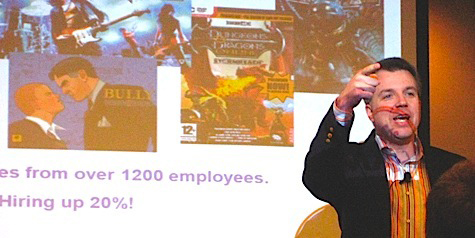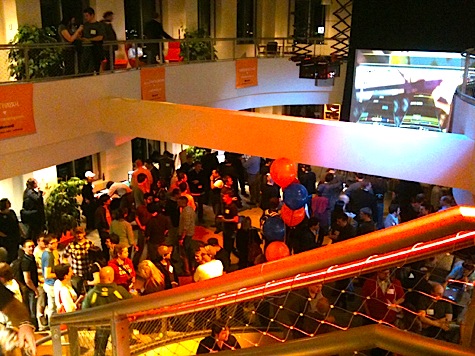This post has not been edited by the GamesBeat staff. Opinions by GamesBeat community writers do not necessarily reflect those of the staff.
Xbox Live's Director of Programming, known by legions of gamers as Major Nelson, spoke to a conference room packed with eager college students last Thursday at the Microsoft New England Research and Development center (aptly named NERD) near Kendall Square.
Of course, everyone there was a nerd, and when this many nerds get together, we get excited. Major Nelson, real name Larry Hryb, knows that well. He was excited too.
He began by telling us how he got started working with the Xbox Live team. "Everything I did leading up to this kind of prepared me for this role," he said. "I was brought on the team specifically to have a dialogue with the community."
He's done a good job, too. Through Twitter, podcasts and majornelson.com, Hryb has spent the last several years becoming the public face of Xbox Live. He's a necessary and beloved intermediary between the aggressive Xbox community and the suits at Microsoft.
"I wanted to have.. a real, honest conversation, that was open, and had a real level of transparency," he said.
Hryb was part of the small team that came up with Xbox Live Achievements, for better or worse, and he had a large role in 2008's massive New Xbox Experience (NXE) interface update to the Xbox 360. What made the NXE so important to Hryb was the fact that it was the first time a home console had been completely revamped with a software update.
"At Microsoft, we learned the power of software," he said.
He also had plenty to say about Microsoft's upcoming mobile plans. Though he couldn't give us too many details, he hinted at some things that sound pretty worthwhile.
"Think about how you can stay connected to the community," Hryb said in response to a question about Xbox Live functionality on Windows phones. "We're really forcing the team to think about how to do gaming the right way." He suggested that in the future, a puzzle game you play on your phone could have an effect on your FPS experience on Xbox Live. "You got your Bejeweled in my Modern Warfare!" "You got your Modern Warfare in my Bejeweled!" It should be noted: I definitely made up that example.
When asked about the possibility of a web browser for the 360 ("The PS3 has one!"), Hryb quipped, "Have you tried it on the PS3?" He confessed that they've got it working "in the lab," but that it's not something they would ship. Instead, he said, they're concentrating on delivering "optimized," bite-sized "best of the web" experiences, like the 360's Last.FM, Facebook, and Twitter widgets.
"Granted, [Twitter's] maybe not the best app," he confessed, eliciting a collective wry chuckle.
As far as being in Boston goes, Hryb said he "would love to have an office here." He knows that a team works better when they're not geographically separated. "There is a tangible value to having people in a single place like this."
Following his talk was a panel discussion that included such industry personalities as Michael Cummings, Darius Kazemi, James Silva, Kent Quirk, Dan Scherlis, and Major Nelson himself. The panelists focused on how to get hired in the game industry (although they somehow failed to address the very important role of game journalists- what an oversight, right?).
"We get it. You play games," said Scherlis, production and social media guru. "That's not a differentiator." He said that game companies are looking for people who are truly passionate, and have more varied experience than simply a life spent playing lots of video games.
Networking expert Kazemi wanted to stress that experience with games is, indeed, important, however. "The number one thing that I want students to be doing when they are students is to make games," he said.
That's how indie developer James Silva, of The Dishwasher: Dead Samurai and I MAED A GAM3 W1TH Z0MB1ES 1NIT!!!1 fame, got his foothold in the industry. In addition to helping you get a job, he said, developing your own games has the advantage of allowing you to maintain the purity of your ideas.
"We've all played games that have had their visions compromised," said Hryb. That can happen when a team of hundreds gets their hands on an idea, but indie developers- and students developing their own games- retain the ability to control every aspect of their games.
"It is a bit of a God complex," said Silva. "I kind of worry about that."
Hryb also instructed aspiring game developers to consider creating games for less obvious, relatively untapped markets. "My mother's a gamer. She's 72 years old," he said. "She just plays a different kind of game." Namely, Mahjong.
Overall, the panel stressed that all programmers should learn design, every artist should learn programming, and most of all, everyone should love what they do (and do what they love). The message sounded familiar to me, as most of my journalism professors like to stress the importance of having numerous skills and being an all-in-one package, of sorts.
As the panel wrapped up and a few bits of swag were distributed to audience members, folks began to trickle out of the conference room, heading to other floors to mingle and network with the multitude of Massachusetts game companies in attendance. Attractions included mega sized Rock Band, free food and less-free booze. I don't know about anyone else, but I wasn't getting carded (I'm fresh enough over the legal drinking age threshold to still feel a tingle of excitement at this).


